CMS approves new MRI standards related to remote scanning
The Centers for Medicare & Medicaid Services has approved new MRI standards related to remote scanning and portable imaging machines.
The Intersocietal Accreditation Commission, a CMS-approved accrediting body, announced the new updates on Nov. 21. Its revisions help imaging facilities implement policies that ensure the safe delivery of MRIs, including when key personnel are located off-site.
IAC published its new Standards & Guidelines for MRI Accreditation following a 60-day comment period, with the nonprofit incorporating feedback in the final document. Applicant facilities are required to comply with the revisions, effective immediately.
“The approval of the revised standards could not have come at a more pivotal or timely moment for the MRI community,” Amanda Garlock, president, IAC MRI, and diagnostic imaging manager at Providence Regional Medical Center Everett, Washington, said in an announcement. “Not only do they include provisions which reaffirm our ongoing commitment to quality improvement and ensuring that patients receive the highest quality exam, but we have also included a new section outlining standards for those who utilize remote scanning technologies and technologists.”
These are the first standards to require that a registered technologist always remain with the patient during remote scans, “ensuring that qualified personnel will be there to provide care should the need arise,” Garlock added. To achieve accreditation, facilities delivering remote MRIs must institute and adhere to policies addressing potential equipment or communication failures, internet instability and power outages. Imaging providers also must follow division of responsibility rules and comply with standards already in place for local MRI operations when delivering remote scans.
In a separate announcement, IAC said it also is revising standards related to portable MRI scanning and contrast administration. On the latter, the commission reported that radiology providers have faced challenges meeting physician supervision requirements. IAC has developed revisions to the policy to help ensure a “safe environment for patients having injections with the presence of appropriately trained nonphysician personnel.” Portable MRI-maker Hyperfine also commented on the guidelines Nov. 21.

